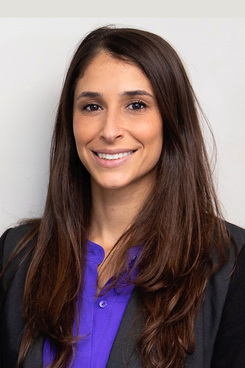Becky Greenfield, 32, Wolfe Pincavage
Office: Miami.
Practice area: Health care law.
Law school and year of graduation: University of Miami School of Law, 2015.
How long have you been at the firm? I have been at Wolfe Pincavage for approximately three and a half years.
How long were you an associate at the firm? I was an associate for a little over three years.
 Becky Greenfield/courtesy photo
Becky Greenfield/courtesy photo
Were you an associate at another firm before joining your present firm? Prior to becoming an associate at Wolfe Pincavage, I was a health care associate at Greenspoon Marder for a short period of time. Prior to that, and immediately after law school, I was a litigation associate at GrayRobinson.
What’s the biggest surprise you experienced in becoming a partner at a boutique law firm? I made partner in 2021 and one of the biggest surprises was the increasing importance of staying ahead of legal technologies to effectively implement results-oriented legal solutions. For example, as the legal industry moves toward value-based billing, lawyers must quantify their services based on the value they can provide their clients. With this in mind, firm management must actively create business plans that eliminate inefficiencies.
What do you think was the deciding point for the firm in making you a partner? For me, it was the culmination of my work ethic and dedication to client-centered service. As the firm’s first hire, I have been an integral part of attracting new clients within the health care industry while establishing trust with existing health systems. This merit-based promotion solidifies my role as a highly sought counselor who fosters relationships and deploys cost-effective, legal approaches, ensuring clients’ immediate and long-term strategic goals are met.
Describe how you feel about your career now that you’ve made partner. As part of firm management, I strive to encourage personal development among junior attorneys to expand their practice area. Additionally, I am eager to build the firm’s book of business by leveraging my industry network to grow our client base, increasing the firm’s revenue streams.
Lastly, I strive to organize various business development opportunities and have an active role in mentoring junior attorney’s on how to be an effective lawyer and expand their practice areas.
What’s the key to successful business development in your opinion? The key is to remain top of mind by consistently creating various touchpoints with prospective clients. Although it is a time-intensive endeavor, participating in industry organizations while getting to know your prospects at a personal level is by far the best way to generate new business. Understanding your client’s business and industry demands is also crucial in adding value to your relationships and establishing trust.
What’s been the biggest change, day-to-day, in your routine since becoming a partner? Overall, my role has remained the same. Now, as partner I am an integral part of the decision-making process for all important firm decisions.
Who had the greatest influence in your career that helped propel you to partner? Douglas Wolfe, managing partner, [at] Wolfe Pincavage. Well-versed in health care law, Doug has been a mentor of mine prior to joining Wolfe Pincavage. He has always shared his insight and experience on how to best guide health systems through the ever-evolving framework of new regulations and compliance. As an advocate for internal growth opportunities, Doug taught me how to hone my skills as an effective lawyer. Additionally, he has instilled in me the importance of growing my professional network, investing firm resources, and encouraging me to get involved with industry organizations, such as the Healthcare Financial Management Association (HFMA).
How has owning a Cross-Fit gym impacted how you practice law? Despite being entirely different, one quality I have learned from owning a Cross-Fit gym is the importance of understanding your client’s goals. Deploying effective time management skills is critical for both businesses as your day-to-day may change and one must be flexible to quickly pivot their tasks for the day whether that be adopting a business strategy to align with new health care regulations or replacing damaged equipment. Lastly, both industries have shown me the importance of establishing trust to get referrals and grow your business.
What’s the best piece of advice you could give an associate who wants to make partner? If you want to make partner, it is not always enough to sit behind a desk and meet your billable requirements. Through my experience, I’ve learned that you must identify your strengths to demonstrate the various ways you provide value to the firm, whether that is by increasing the firm’s community initiatives or developing strong networking circles that will bring in new business to the firm.
How do you grow professionally while everyone is working remotely? Get creative. As an example, I heard from a few clients and prospective clients that they miss the face-to-face networking that usually exists at industry events. With this in mind, I developed a “Managed Care Ladies that Wine” virtual happy hour, inviting the women in my networking circle (clients and nonclients alike) to come together, catch-up, and discuss timely topics impacting our industry as well as tips to improve our work-from-home setup. To mimic an in-person event, our firm will be sending each attendee a bottle of wine to their homes for us to enjoy during the Zoom. Small personal touches like this distinguish us from other law firms and allow us to maintain personal and professional relationships with our clients, allowing for open lines of communications the next time they have a question in our related field.
What advice would you give to associates who want to make partner in this COVID era. For the most part, I think things are relatively the same. As many companies continue to work from home, associates must remember to foster personal workplace relationships in different ways than before as co-worker’s desks are no longer a few steps away. With this in mind, associates must be proactive about getting face time with the more senior attorneys at the firm by scheduling a one-on-one virtual coffee break, or picking up the phone to engage in thoughtful conversation rather than writing an email.
As a first-year associate, your sole job is to learn how to be an attorney and bill hours. However, it is also important to develop relationships with the more-seasoned attorneys, communicating your willingness to learn different aspects of their practice area. In my opinion, asking thought-provoking questions and informing attorneys of your interests will pave the path for collaboration opportunities.
What attributes are essential for a female leader to embody? Leading by example is one of the most important qualities of an effective leader, as leadership is comprised of action. Despite female leaders possessing the same traits, including vision, perseverance, and passion, as their male counterparts, very few women hold prominent leadership roles. Timed with the first female vice president’s inauguration, companies must redefine their work culture to embrace women, creating empowered, gender-equal workplaces. With studies showing effective leadership is gender-balanced, exhibiting both traditionally feminine and masculine qualities. With this in mind, key attributes female leaders must embody include the ability to take a cooperative approach to decision-making and multitasking.
Related article: No Surprises Act and Its Intersection With Fla.’s Balance Billing Protections
Find more career development insights from our ‘How I Made It’ Q&A series on law.com.
 ALM’s Professionals Network on LinkedIn, Advancing Future Leaders. We are excited about this pivotal group. Click here to join.
ALM’s Professionals Network on LinkedIn, Advancing Future Leaders. We are excited about this pivotal group. Click here to join.
NOT FOR REPRINT
© 2024 ALM Global, LLC, All Rights Reserved. Request academic re-use from www.copyright.com. All other uses, submit a request to [email protected]. For more information visit Asset & Logo Licensing.













